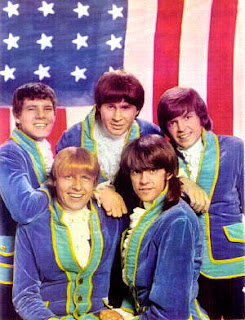Lindsay was born in Eugene, Oregon and grew up in Idaho. He began performing at the age of fifteen with local bands that played locally and was invited to sing with Freddy Chapman and the Idaho Playboys after he won a local talent contest.
After Chapman moved away, Lindsay saw the other band members and a new member, Paul Revere, playing at a local hall. He persuaded them to let him to sing a few songs. The next day he was working at his regular job at a bakery when Paul Revere came in to buy supplies for a hamburger restaurant that he owned. This meeting "over pastries" began their professional relationship.
Lindsay became lead singer and saxophone player in a band with Revere and several others. He suggested they call themselves "The Downbeats" after a magazine with the same title.
They made some demo tapes in 1960 in Boise, Idaho, and signed with a record company called Gardena Records. The group scored their first national hit with the piano/sax instrumental "Like, Long Hair" which peaked at #38 in the Billboard charts on April 17, 1961.
After changing personnel a few more times, the band recorded the song "Louie, Louie" about the same time that a rival Northwestern band, The Kingsmen, recorded the song. The Kingsmen version was the one that charted nationally, but Mark and the band were also gaining notice.
Around the time "Louie, Louie" was recorded, they decided to use Paul Revere's name as a gimmick and bill themselves as Paul Revere & the Raiders. They began to dress in Revolutionary War-style outfits. Lindsay carried the theme a bit further by growing his hair out and pulling it back into a ponytail, which has become his signature look.
Lindsay and the group caught the attention of Dick Clark, who was developing Where the Action Is, an afternoon show for the teen market. Clark hired the group as regular performers, and the group soon became very successful. Lindsay's good looks and singing voice, quickly gained him immense popularity, and he became one an American teen idol in the 1960s. Lindsay soon started working not only as the singer of the group, but also as a composer and producer.
(Continued below video and Amazon portals ...)
Press album cover for direct link to the entire Amazon Website):
-----
The Raiders were the first rock group signed by Columbia Records and were produced by Terry Melcher, the son of actress and singer Doris Day. Lindsay and Melcher became friends. (They shared a house for a while, which later became infamous as the site of the horrific murders of actress Sharon Tate and others, committed by members of Charles Manson's "family.")
By 1968, Lindsay had completely taken over the writing and producing tasks for the group. Paul Revere & the Raiders had a revolving cast of band members, with only Revere and Mark Lindsay remaining in the group since its inception.
Where the Action Is ceased production, and Dick Clark created another show, Happening 68, which was to be hosted by Paul Revere and Mark Lindsay and feature the group. The group itself was featured prominently in this show, whereas in Where the Action is, the entire group was part of an ensemble of other musical performers.
Happening '68 premiered in January 1968. The show was so popular that the group also hosted a daily version over the summer of 1968, called It's Happening. Happening '68 survived into 1969, at which point the name of the show became Happening. The show was canceled in October 1969.
By this time, Lindsay began to record solo records and to produce records for his fellow bandmate, Freddy Weller, who went on to have his own solo success in the country music genre.
Lindsay had some success with such songs as "Arizona" which sold over one million copies, and was awarded a gold disc; and "Silverbird." He recorded "Indian Reservation," a song written by John Loudermilk years earlier, to be a solo recording, but the decision was made to release the song under the name "The Raiders" and it went on to be the only number one song in the group's history.
Mark continued to chart solo singles throughout 1970-71; "Miss America," "And the Grass Won't Pay No Mind" in 1970; "Problem Child," "Been too Long On the Road" and "Are You Old Enough" in 1971.
By the mid-seventies the group lost their Columbia contract. Mark Lindsay officially left the group in 1975 when he and Paul Revere apparently had different visions for the group and their own individual pursuits. He did make a few more appearances in 1976 for some Bicentennial performances, as well as a Dick Clark produced reunion with his Action era bandmates in 1977.
Lindsay continued to record solo singles for a few years before retiring from performing to serve as head of A&R for United Artists Records. He contributed to the recordings of artists such as Gerry Rafferty (on "Baker Street"), Kenny Rogers, and others. His also composed jingles for commercials - including Baskin Robbins, Datsun, Kodak, Pontiac and Levi's among others - and scores for motion pictures.
In the ensuing years Mark continued to collaborate and record and in 2003 announced he would retire from touring, but later reconsidered. A recording of his first "farewell" show was released in 2004.
During of summer 2010, Lindsay had a heavy touring schedule throughout the U.S. as part of the Happy Together: 25th Anniversary Tour, along with Monkee Micky Dolenz, Flo & Eddie of The Turtles, Rob Grill of The Grass Roots, and The Buckinghams.
####






















